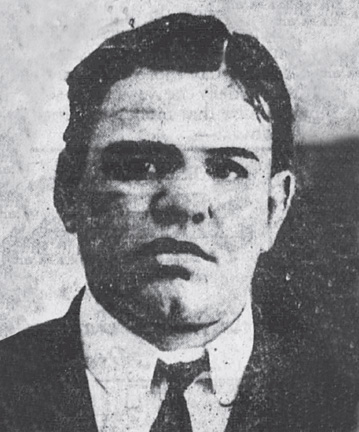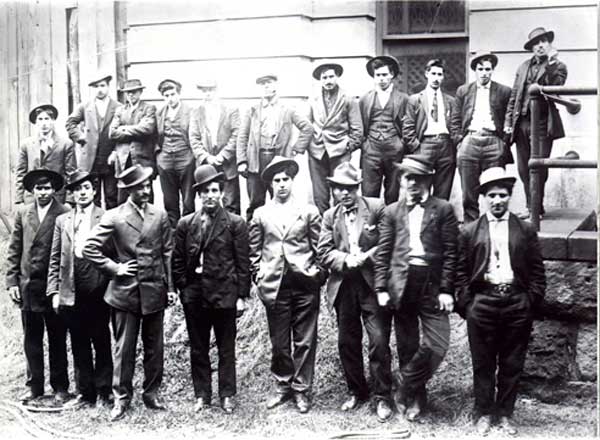Why does this short story by Jorge Luis Borges create such power? Maybe it’s the human frailty underlying the tale of a tough New York gangster.
Welcome back to this slow process of reviewing every short story written by Jorge Luis Borges. So far, we’ve looked at the stories of Lazarus Morell, Tom Castro, and the Widow Ching. Today it’s a story of another villain, the New York gangster Monk Eastman.
Reading these stories again made me wonder why I enjoyed them so much. These first stories, from the 1935 collection A Universal History of Iniquity, are essentially just biographies of various villainous characters, cribbed from other books. Borges doesn’t even bother with much scene-painting or dialogue, and there are none of the wildly imaginative infinite libraries and labyrinths of his later work.
So what is there? Well, first of all, they’re dramatic stories. Monk Eastman’s journey from petty street thug to bouncer to Tammany Hall enforcer to the head of a criminal gang of 1,200 people is worth following. Then there are the eye-catching descriptions:
“Eastman would leave his house to inspect his gangster empire with a blue-feathered pigeon perched on his shoulder, like a bull with a heron on its hump.”

But more than all this, I think what I like about these stories is the way Borges undercuts the glamour and heroism that we have come to expect from stories of pirates and gangsters and other outlaws, and instead shows us their human frailty.
All of the stories so far have followed a similar trajectory: a rise to power and fame, followed by an abrupt fall. In each story, too, there have been climactic showdowns that could have led to greater success if things had gone slightly differently, but instead ended in anticlimax, prefiguring the fall.
In the story of Monk Eastman, this moment of just-missed climax is the Battle of Rivington Street, a huge gunfight between Eastman’s gang and the rival Five Points Gang of Paul Kelly. If he’d won, he’d have been the undisputed criminal kingpin of New York City.
But the battle ends in a stalemate, as does a subsequent fistfight with Kelly. And then, while Kelly is pragmatic enough to accept a truce, Eastman stubbornly refuses:
“Kelly, who recognized that politicians were better than all the Colts ever made when it came to dissuading the police from doing their duty, immediately saw the light; Eastman, with the arrogance of his great stupid body, waws spoiling for more grudge fights and more bullets.”
It’s the beginning of the end. Eastman is arrested and spends a decade in Sing Sing, and when he comes out, the gang has scattered. His power is gone. He fights in World War I, and then returns home to fight some more, finally dying in typically abrupt Borges fashion in the final few terse sentences of the story. His body was found on Christmas Day 1920 with five bullets in it.
“A common alley cat, blissfully ignorant of death, was pacing, a bit perplexedly, about the body.”
There’s something in the way Borges tells these stories that captures the frailty of human life, the way even outsized lives like those of Monk Eastman come to the same banal end. The successes are fleeting, the declines swift and inevitable.
In telling the stories of such full, dramatic lives in just a few pages, Borges shaves off some of the momentary drama and leaves us with the bigger picture, in which all those fights Monk Eastman won were only a preparation for the one he would finally lose. His stories feel anticlimactic because, in real life, death is rarely glorious or heroic. It’s rarely the dramatic ending that the stories of our lives deserve. It’s usually abrupt and senseless, the biggest anticlimax of them all.




There are 5 comments
Your insightful review has me intrigued by this author again, Andrew, as I have a couple of his books on my list. Which of his wildly imaginative later works do you recommend I start with?
I love The Garden of Forking Paths. It’s one of his earlier collections, but you start to see the mind-bending stories about infinite libraries and labyrinths that would recur in his later work. There’s a story about a society in which a lottery takes over every aspect of chance in human life, one in which a wizard dreams a man into life and then realises someone else is dreaming him into life, and more weird stuff like that. I’d recommend it!
The lottery story really grabs me. I will prioritise Borges now, thanks!
I tried to find a related comment in the Borges book I was able to borrow from the library and all the pieces are interesting but are also very short and don’t fit here at all!
But I did just listen to a recent episode of the podcast with Marlon James and his agent at PRH, where they discuss dead authors (so as not to get into “trouble” talking about living authors they may or may not like) in which James mentioned that he likes to teach one of Eudora Welty’s stories because of her exploration of “evil”, which is not that “nobody can imagine who would do such a thing, they must be insane” but, instead, “we know full well the kinds of forces that compel people to commit heinous acts and simply don’t want to talk about the truth of it all and how common it all is”. It sounds like there’s a similar compulsion at play here, do you think?
Here’s the podcast if anyone’s interested: https://www.penguinrandomhouse.com/articles/dead-people-pod
Sorry for the late reply – I was travelling and missed this! Yes, I think it’s much more comforting to think of evil people as totally insane, and it’s much more unsettling to find you understand them. I remember once reading a novel about a woman killing her kids, and it was so unsettling because I understood her – I remember the book very well even ten years later (review here: https://andrewblackman.net/2010/03/beside-the-sea-by-veronique-olmi/). I think Borges is definitely doing something similar in these books, undercutting our expectations for gangsters and villains and making them seem just like us.